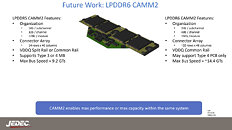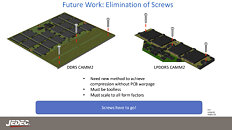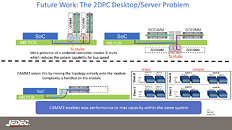TheLostSwede
News Editor
- Joined
- Nov 11, 2004
- Messages
- 17,611 (2.41/day)
- Location
- Sweden
| System Name | Overlord Mk MLI |
|---|---|
| Processor | AMD Ryzen 7 7800X3D |
| Motherboard | Gigabyte X670E Aorus Master |
| Cooling | Noctua NH-D15 SE with offsets |
| Memory | 32GB Team T-Create Expert DDR5 6000 MHz @ CL30-34-34-68 |
| Video Card(s) | Gainward GeForce RTX 4080 Phantom GS |
| Storage | 1TB Solidigm P44 Pro, 2 TB Corsair MP600 Pro, 2TB Kingston KC3000 |
| Display(s) | Acer XV272K LVbmiipruzx 4K@160Hz |
| Case | Fractal Design Torrent Compact |
| Audio Device(s) | Corsair Virtuoso SE |
| Power Supply | be quiet! Pure Power 12 M 850 W |
| Mouse | Logitech G502 Lightspeed |
| Keyboard | Corsair K70 Max |
| Software | Windows 10 Pro |
| Benchmark Scores | https://valid.x86.fr/yfsd9w |
Yesterday we reported on DDR6 memory hitting new heights of performance and it looks like LPDDR6 will follow suit, at least based on details in a JEDEC presentation. LPDDR6 will just like LPDDR5 be available as solder down memory, but it will also be available in a new LPCAMM2 module. The bus speed of LPDDR5 on LPCAMM2 modules is expected to peak at 9.2 GT/s based on JEDEC specifications, but LPDDR6 will extend this to 14.4 GT/s or roughly a 50 percent increase. However, today the fastest and only LPCAMM2 modules on the retail market which are using LPDDR5X, comes in at 7.5 GT/s, which suggests that launch speeds of LPDDR6 will end up being quite far from the peak speeds.
There will be some other interesting changes to LPDDR6 CAMM2 modules as there will be a move from 128-bit per module to 192-bit per module and each channel will go from 32-bits to 48-bits. Part of the reason for this is that LPDDR6 is moving to a 24-bit channel width, consisting of two 12-bit sub channels, as mentioned in yesterday's news post. This might seem odd at first, but in reality is fairly simple, LPDDR6 will have native ECC (Error Correction Code) or EDC (Error Detection Code) support, but it's currently not entirely clear how this will be implemented on a system level. JEDEC is also looking at developing a screwless solution for the CAMM2 and LPCAMM2 memory modules, but at the moment there's no clear solution in sight. We might also get to see LPDDR6 via LPCAMM2 modules on the desktop, although the presentation only mentions CAMM2 for the desktop, something we've already seen that MSI is working on.



View at TechPowerUp Main Site | Source
There will be some other interesting changes to LPDDR6 CAMM2 modules as there will be a move from 128-bit per module to 192-bit per module and each channel will go from 32-bits to 48-bits. Part of the reason for this is that LPDDR6 is moving to a 24-bit channel width, consisting of two 12-bit sub channels, as mentioned in yesterday's news post. This might seem odd at first, but in reality is fairly simple, LPDDR6 will have native ECC (Error Correction Code) or EDC (Error Detection Code) support, but it's currently not entirely clear how this will be implemented on a system level. JEDEC is also looking at developing a screwless solution for the CAMM2 and LPCAMM2 memory modules, but at the moment there's no clear solution in sight. We might also get to see LPDDR6 via LPCAMM2 modules on the desktop, although the presentation only mentions CAMM2 for the desktop, something we've already seen that MSI is working on.



View at TechPowerUp Main Site | Source








